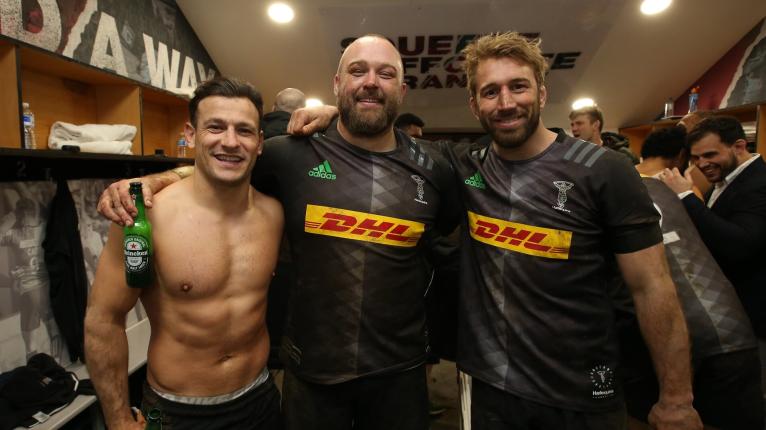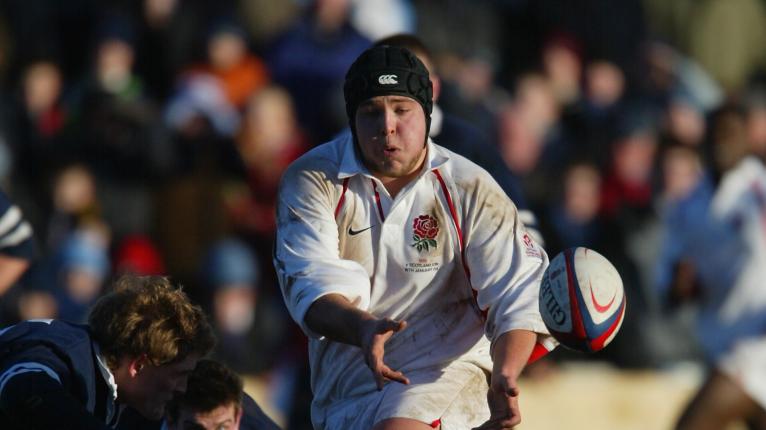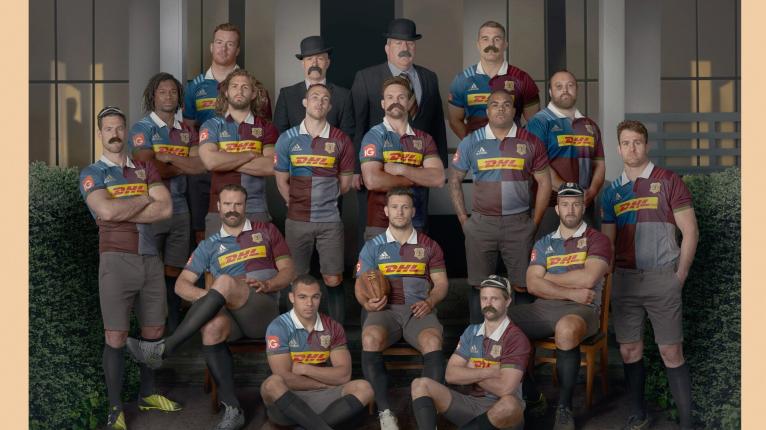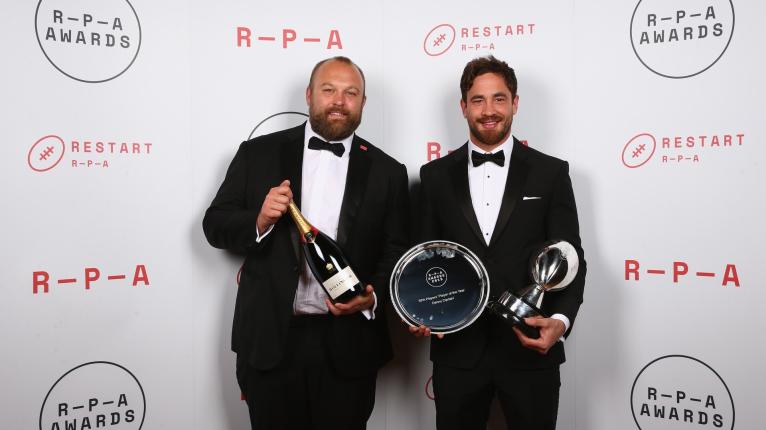'It was the scariest phone call ever in my life. I was thinking, that's it, I'm going to die'

Nineteen weeks after professional rugby in England was forced in lockdown, Mark Lambert, the now-retired Harlequins prop, is still finding it all a bit surreal. He had finished up at the club’s training ground on a Friday expecting to see all the many familiar faces the following day for the trek north for the Premiership Cup final only have his career suddenly ended overnight.
Someone on the Quins non-playing staff had taken ill and rather than risk the showpiece going ahead in Manchester that Sunday amid the pandemic that was taking hold across the country, the fixture was postponed. With it, Lambert’s 17-year career at the London club was over in a flash.
There was no wriggle room in the aftermath for the 35-year-old. Whereas Harlequins offered another club lifer, Chris Robshaw, a short-term deal to have him involved when the suspended 2019/20 season finally restarts next month, there was no requiem for Lambert.
He was surplus to requirement, going from being pencilled in to start at loosehead in a cup final to never lacing up his boots again. “Well, that wasn’t really my decision to make,” said Lambert when asked by RugbyPass was there any possibility he could have done a Robshaw and returned to Harlequins for one last hurrah. “It was never a suggestion that would happen.”
In an interview that lasted for more than half an hour, the expiry of contract was the only time the front row forward was in anyway tentative with a reply. Not that he has been left craving the pre-season he is now missing. He isn’t. It’s just that he would have loved to have bowed out on his own terms on the pitch rather than have it taken away through no fault of his own.
After 17 years, it’s time to hang up the boots. Thank you @LanesboroughSch @HaslemereRFC,@RGSGuildford, @esherrugby, @RichmondFC1861 (once) and of course @Harlequins. You’ve been my rugby life. Never underestimated the opportunities and I’ll never forget the memories. Thanks x https://t.co/gBsCsqqUbw
— Mark Lambert (@marklambert3) June 24, 2020
“I’m a big lad, a front row player, so I have never desperately craved pre-season,” he admitted. “It has always been hard yards. There is elements of that I’m relieved not to be doing, down ups, bronco tests, shuttles, all that sort of stuff.
“But the other side is it’s a strange way to finish. I was announced as starting in the Prem’ Cup final. I’d left the boys saying, ‘See you all in 24 hours’ time’. But we never came back in and four months later my career was over. It’s definitely strange. I would never have anticipated that this would be the way it would finish.
“The thing that takes a bit more getting used to is the habit of being in around training and mostly the social side of being in and around the guys, sharing those experiences with other players… but my body is probably grateful I’m not going through another pre-season.
“Terrible is relative,” he continued, reflecting on the sudden loss of his career compared to the bigger picture of the world getting so suddenly turned upside down. “There is plenty of people struggling with greater issues than I am, so there is a bit of perspective around that.
“I was lucky in many ways because I was fortunate to have a really long career and I’d probably known for a couple of years this [the end] was coming at some point… it’s probably the emotional side that takes the most getting used to, but I’m lucky I’m busy.
“We just recently had our third child – I have got a wife and three young kids – and a lot of things going in life to keep me busy. But yeah, I’d be lying if I said it wasn’t an adjustment. It’s probably more the interpersonal connections and the emotional side that takes a bit of getting used to.”
His way of life had been encapsulated a couple of weeks before the lockdown, Lambert given the honour of leading the Harlequins team out with his children for the Stoop win over Exeter as it was his 250th appearance for the club. That was an extraordinary milestone in the context of the lesser known backstory to the prop’s lengthy career.
Whereas Lambert headed off into retirement as a venerated one-club Harlequins man with an enviable collection of memories, remembrances he says were capped by the 2012 Premiership title win and an upset Champions Cup away win at Toulouse, the long forgotten quirk is that four-and-a-half years passed in between first Premiership start, an October 2004 visit to Kingsholm, and his second, the February 2009 trip to the Madejski.

He can chuckle heartily now about that remarkably lengthy layoff. “Dave Ward came to Quins later on and we used to laugh about it – we’re pretty sure we would be first and second in the list of longest time between first and second Premiership appearances. I was four-and-a-half years at the same club and Dave was I think six or seven years.
“He had one start at Bath, went off to another few clubs, then went to Cornish Pirates and played in the Championship for a few years and then came back to Quins. We might be one and two on that all-time list. I would be surprised if anyone beat us. It was definitely a long old wait.”
Lambert wasn’t chuckling though when he was living through the horror of the serious brain injury that had threatened his career, followed by two significant knee injuries that further derailed progress as he attempted to fulfil a talent at Harlequins that was recognised by England age-grade level.
Olly Morgan, Topsy Ojo, Mathew Tait and Mark Simpson-Daniel were some fellow starters for England U19s in early 2004 who moved on to earn Test caps soon enough, with reserves Dylan Hartley and Robshaw more than capably following in their slipstream. For Lambert, though, the next few years were quickly written off, the initial indication there might be something seriously wrong dawning during an excruciating Harlequins scrum training session.
“I made my debut for Quins the year we got relegated, but then I had lots of injuries, quite a serious brain injury, two significant knee injuries. If you had said to me at that point I would have ended up with 250 games I would have laughed you out of the room. The good thing is I was cheap, very cheap so I was maybe worth a chance, but in 2005 I was told I wouldn’t play rugby again. I went through a six-month period of not being in training, very much preparing for life without rugby.”
A special moment on a special day. Thank you all for the support and love on Saturday. Memories for lifetime https://t.co/HzP8kSOxa3
— Mark Lambert (@marklambert3) March 2, 2020
An injury crisis had allowed the second-year academy player to gain a first-team debut and on his way back some months later from an injury of his own, he felt he couldn’t let the side down when called on in another emergency. “I was just a tighthead then, didn’t play loosehead,” he explained, taking up the story about his career nearly ending before it started. “I was the only fit tighthead at training so I needed to be fit for the session to happen.
“We were out doing a really tough session, scrummaging in the sled, mauling, lineouts that sort of stuff which was tough as a young kid. Then halfway through I hit a scrum and just got an awful, awful headache. I didn’t really know what was going on. When you’re in that environment surrounded by 20 senior first-team professionals I wasn’t going to say I have got a headache, I need to stop.
“I kept training, was a bit all over the place, got to the end of the session and realised something wasn’t quite right. I started throwing up and was light sensitive. The boys were laughing at me because they thought the young lad couldn’t cope with how tough the session would be, which was completely understandable, and then I went into the physios and they realised something potentially wasn’t right.
“They rushed me off to hospital and I’d a scan, had this horrendous headache for about four hours which felt like I was getting whacked around the head with a hammer, but it then passed. They sent me home and said there was nothing. I was sat at home the next day, still living with mum and dad on my academy contract, and I got a phone call saying we have found something on your brain scan, you need to come into hospital straight away. It was the scariest phone call I ever had in my life. I was at home alone thinking, that’s it, I’m going to die.”
A battery of tests ensued, including lumbar puncturesm, to see had he bled into his brain. Eventually it was diagnosed that he somehow dissected the anterior cerebral artery behind his left eye, an almost unheard of injury as it doesn’t generally happen without a major artery blockage somewhere else, and it required what he believed would be career-ending surgery.

“They left me in the recovery room and at that point I was like, ‘Right, it’s all over. That’s my career done, I’m never playing rugby again’. It was a really dark time but something that had a profound impact on me in general. A few weeks before the injury I’d been in training with England U21s at Bath University and I distinctly remember coming home after the surgery. Back in the day you had Teletext and I was flicking through the sports stories, flicked onto rugby union and one of the lead stories was ‘England U21 prop suffers serious injury’.
“I was reading and going, ‘This is weird, how does anyone know I have had this thing with my brain?’ I wasn’t really an U21s prop, I just trained with them, but I just assumed it was me. I opened the story and it was about Matt Hampson and the injury he had. It knocked me back in my seat. I just thought, ‘Wow, okay’. It put things into perspective incredibly quickly about how fortunate I’d been.
“If you had said to me in that moment I would play until I was 35 I would have called you an idiot. Originally the advice was never to play again but six months later they said, ‘Well you have kind of been fine, why don’t you go back and try?’ I did. I sat on an exercise bike, did ten minutes. Next day I came and did 20 and after over four months of individual training I could come back to play… it was definitely a strange time but it played a massive part in shaping my attitude to things.”
With Harlequins having stood by him, Lambert was inclined to stand by them in the many years that followed, the Quins fan, who mentions attending the 2001 Powergen Cup final defeat to Jonny Wilkinson’s Newcastle, opting to stay at The Stoop and battle it out with a certain Joe Marler rather than move elsewhere and become a first-choice selection.
“I did consider it on two, maybe three occasions, and I appreciate I made decisions other people wouldn’t have made. I was in a position where for the vast majority of my career I was competing with or in a squad with Joe Marler, who is a world-class player and a very close friend.

“I did consider going somewhere else and pursing things, seeing if I could be a starter at another club or what I might be able to achieve personally, and I did think about that. Maybe this is a flaw in me or maybe it’s just the way I’m wired, but the reason I love playing the game is I love being part of the team and that has been the case since I was a small kid – it’s team sport that motivates me to play and representing a club that meant something to me.
“I did think of going to other clubs and I’m sure I would have loved it as they are great other clubs around the game, but I made the decision that I was happy and settled and later on in my career I was married, had kids and my family lived locally… it was just right for me to stay.
“Maybe I could have gone and played 50 or 100 games at another club but maybe it wouldn’t have meant as much as looking back at playing 250 for one. I wasn’t a die-hard fan throughout my youth. I wasn’t on the sideline every game, but I have always had an emotional connection to the club and when it came down to it, it meant more for me to stay and be part of that collective rather than do something purely for myself and maybe not love it as much as I did.”
In his long time involvedm with Harlequins, Lambert has seen rugby change out of sight. “There isn’t really an element of the game which is the same in that period of time,” he said, selecting analysis and sports science as the two most transformed areas. “It’s just a different game really. The intensity, the impacts, the way defence has changed. You look back at old games in the lockdown, even the Premiership and LV= Cup finals from 2012 and 2013, defence in terms of linespeed and the confrontational element, there has been a massive shift.”
So too the level of care for modern-day players. As someone who hails from a medical family – his grandmother, mother and sister have all been in the trade – Lambert’s own interest in caring for others accelerated when Olly Kohn and Tom Williams stepped away from being the club’s RPA rep, paving the way for the prop to take the reins and go on in recent years to become the players’ union chairman.
I’ll remember that day with that group of lads forever x https://t.co/dtEzH5BwI9
— Mark Lambert (@marklambert3) June 13, 2020
The lockdown has been turbulent, to say the least for the union, with revised player contracts one of many battlegrounds. It’s all eaten bread Lambert doesn’t want to go over, preferring instead to hope these much strained relations can be repaired in the weeks and months ahead.
“I probably don’t need to talk too much about what is gone but I will always be someone who remains optimistic about what can be achieved in the future and I remain absolutely convinced that the best way to do that is through work with all stakeholders in the game to be collobarative and constructive,” he explained, adding that he hopes to stay on at the RPA in a different role now that he in no longer a player.
“There is a lot of building blocks in place in English rugby to make things much better and to make it a great product. What has driven the RPA in the last few years was the desire for England to be the best place in the world to play domestic professional rugbym, or play professional rugby in general, and that continues to motivate us.
“There are definitely things that can be done better and there is some things that are done really well – it’s just about working hard to make those conditions better and made sure the game is held to account… I definitely intend to stay involved in the game and stay involved in sport, and in the short-term I will be staying involved with the RPA. That is all getting finalised at the moment.
“Every since I can remember, sport has been one of my great passions in life and I have been fortunate enough to have a professional career for the best part of two decades. I don’t see myself moving a million miles away from this world any time soon.”







































Comments on RugbyPass
“South African franchises would be powerhouses if we had all our overseas based players back in situ. We would have the same unbeatable aura the Toulouses, Leinsters or Saracens of this world have had over the last decade or so.” Proof that Jake white does not understand the economics of the game in SA. Players earning abroad are not going to simply come back and represent the bulls. But they might if they have a springbok contract.
22 Go to commentsA lot of fans just joined in for the fun of it! We all admire O'Gara and what he has done for La Rochelle
3 Go to commentsThe RFU will find a way to mess this up as usual. My bet is there will be no promotion into the the Premiership, only relegation into National League One. Hopefully they won’t parachute failed clubs into the league at the expense of clubs who have battled for promotion.
2 Go to commentsWell that’s the contracts for RG and Jordie bought and paid for. Now, what are the chances we can persuade Antoine to hop over with all the extra dosh we’ll have from living at the Aviva & Croke next season…??? 🤑🤑🤑
3 Go to commentsWow, that’s incredible. Great for rugby.
3 Go to commentsYou probably read that parling is going to coach the wallaby lineout but if not before now you have.
14 Go to commentsIf someone like Leo Cullen was in O’Gara’s place I don’t hear Boo-ing. It’s not just that La Rochelle has hurt Leinster and O’Gara is their Irish boss. It’s the needle that he brings and the pantomime activity before the game around pretending that Munster were supporting LaRochelle just because O’Gara is from Cork. That’s dividing Irish provinces just to get an advantage for his French Team. He can F*ck right off with that. BOOOOO! (but not while someone is lying injured)
3 Go to commentsDid the highlanders party too hard before the game? They were the pits.
1 Go to commentsWhat a player! Not long until he’s in the England side, surely?
2 Go to commentsHe seems to have the same aura as Marcus Smith - by which I mean he’s consistently judged as if he’s several years younger than he actually is. Mngomezulu has played 24 times for the Stormers. When Pollard was his age he had played 24 times for South Africa! He has more time to develop, but he has also had time to do some developing already, and he hasn’t demonstrated nearly as much talent in that time as one would expect. If he is a generational talent, then it must be a pretty poor generation.
4 Go to commentsThe greatest Springbok coach of all time is entirely on the money. Rassie and Jacques have given the south african public a great few years, but the success of the springbok selection policy will need to be judged in light of what comes next. The poor condition that the provincial system is currently in doesn’t bode well for the next few years of international rugby, and the insane 2026 schedule that the Boks have lined up could also really harm both provincial and international consistency.
22 Go to commentsJake White is a brilliant coach and a master in the press. This is another masterclass in media relations and PR but its also a very narrow view with arguments that dont always hold water. White wants his team to win, he wants the best players in SA and wants his team competitive. You however have to face up to the reality of a poor exchange rate and big clubs with big budgets. SA Rugby cant compete and unless it can find more money SA players will keep leaving regardless of Springbok eligibility and this happened in 2015 - 2017. Also rugby is not cricket. Cricket has 3 formats and T20 cricket is where the money is at. When it comes to club vs country the IPL is king but that wont happen because the international calendar does not clash with the club calendar in rugby. So the argument about rugby going down the same path as cricket is really a non-starter
22 Go to commentsNZ rugby seem not to have learnt anything from professional rugby. Super rugby was dying and SA left before they died with the competition. SA rugby did a u turn on their approach to international players playing overseas and such players are now selected for Bok teams. As much as each country would love to retain their players playing in local competitions, this is the way the world is evolving my friends. Move with it or stay 20 years behind the times. One more thing. NZ rugby hierarchy think they are the big cheese. Take a more humble approach guys. You do not seem to have your players best interests at heart.
3 Go to commentsBeaches? In Cardiff? Where?
1 Go to commentsHe is right , the Crusaders will be a threat. Scott Barrett, ( particularly), Fergus Burke , Codie Taylor, ( from sabbatical) etc due back soon for the Crusaders. There are others like Zach Gallagher too. People can right the Crusaders off, Top 8 , here we come !!
1 Go to commentsWe will always struggle for money to match the other sides but the least the WRU can do is invest properly in Welsh rugby. Too much has been squandered on vanity projects like the hotel and roof walk amongst others which will never see a massive return. Hanging the 4 pro sides out to dry over the last decade is now coming back to bite the WRU financially as well as on the pitch. You reap what you sow.
1 Go to commentsWhat do you get if you cross a doctor with a fish? A plastic sturgeon
14 Go to commentsWhat happened to feleti Kaitu’u? Hasnt played in a while right?
1 Go to commentsGregor I just can’t agree with you. You are trying to find something that just isn’t there. Jordie Barrett has signed until 2028. By the end of that he would have spent probably 11-12 years on Super Rugby and you say he can’t possibly have one season playing somewhere else. It is absurd. What about this scenario, the NZR play hard ball and he decides to leave and play overseas. How would that affect the competition. There seems to be an agenda by certain journalists to push certain agendas and don’t like it when it’s not to their liking. I fully support the NZR on this. Gregor needs to get a life.
3 Go to commentsHope he stays as believe he can do a great job.
1 Go to comments